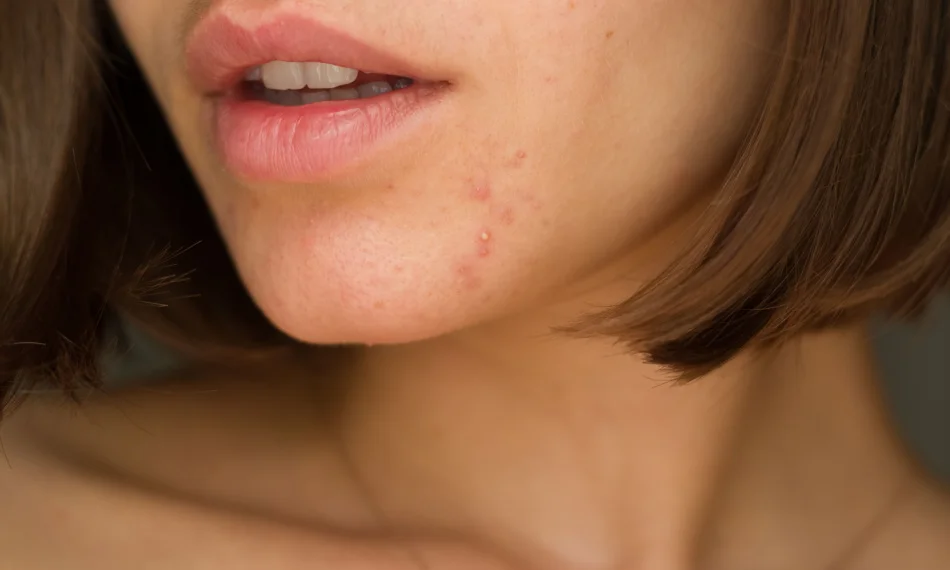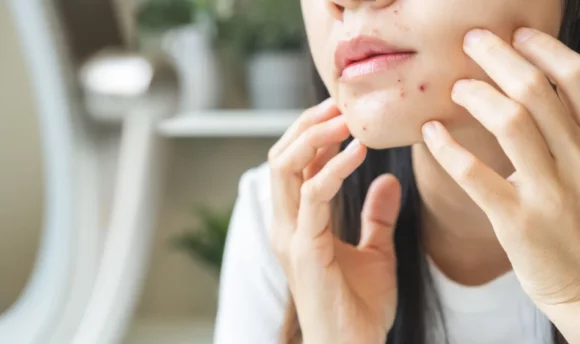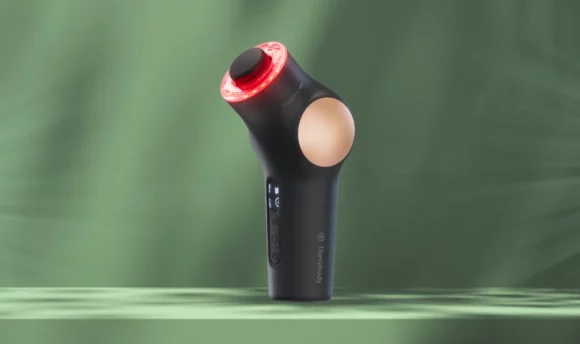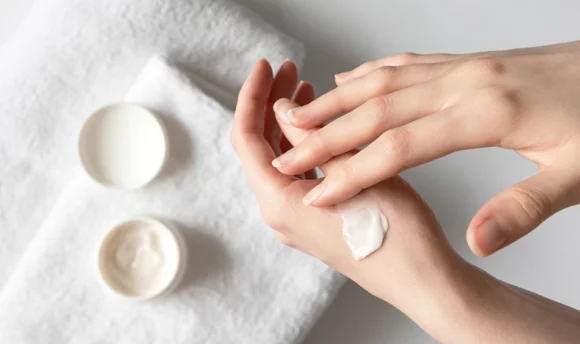Acne Around Mouth: Treating Troublesome Spots
Beauty beyond blemishes: regain confidence in your skin

You may have acne if you’re frequently battling with large breakouts of angry, red spots on the face. This condition occurs when pores become clogged by oil or dead skin cells, leading to both physical and mental side effects that can be difficult to shake off.
Unfortunately, acne often pops up around one of the most visible areas of the face: your mouth. From toothpaste to diet, it can be triggered by a variety of factors, so knowing how to address each of these causes is essential if you’re hoping to cure mouth acne once and for all.
To help you on this journey, we’ll explain some of the top techniques for tackling acne breakouts around the mouth and improving overall skin health.
Understanding Acne Around Mouth: What Is It?
Also known as perioral acne, acne around the mouth occurs around the mouth and sometimes extends to the chin and jawline. It is a common skin condition characterized by pimples, blackheads, whiteheads, and pustules, among other types of acne lesions.
Clogged hair follicles or pores in the facial region around the mouth usually cause this type of acne. Hormonal fluctuations, the use of skincare and oral care products that irritate the skin, certain dietary choices, and even ingredients in lip balm or toothpaste can contribute to acne in this area.
Another reason why the mouth area is so prone to breakouts is that it is frequently touched. Whether by food, beauty products, or your hands, these objects can spread acne-causing bacteria across the skin’s surface. This bacteria will grow inside the pore, leading to the formation of a pimple.
However, the impact of clogged pores goes beyond creating pimples on the face. Studies show that mouth acne has significant psychological effects, causing sufferers low self-esteem, anxiety and depression, embarrassment, and social withdrawal.
Common Causes and Triggers
Before you can treat acne on your chin and around the mouth, you’ll need to identify exactly what’s causing it to flare up. Here are 5 of the biggest culprits that commonly clog pores:
#1 Hormonal changes
Hormonal acne around the mouth can occur at any age but is most often triggered during puberty.
During this time, the production of sex hormones, called androgens, increases in developing teenagers. These hormones, which include testosterone, cause the sebaceous glands to become bigger and produce more oil, making teens more susceptible to clogged pores.
Acne around the mouth area also often impacts women going through pregnancy, menopause, or during the menstrual cycle due to hormonal fluctuations.
#2 Skincare products
Many skincare products, including cleansers, serums, and moisturizers, contain ingredients that will trigger excess sebum production and clog pores.
For instance, products with essential oils and fragrances may smell great, but they could actually be causing irritation, especially on sensitive skin.
Shaving cream is another common culprit of clogged pores around the mouth and chin area, particularly if it’s not properly washed off after use. Shaving can also irritate the skin and may exacerbate certain skin conditions, such as fungal acne, so use a fresh razor every week to prevent this.
#3 Oral care products
Like shaving cream, your toothpaste may be responsible for those spots you can’t seem to get rid of. Certain ingredients like fluoride, baking soda, hydrogen peroxide, menthol, and alcohol could be the culprits for dryness or irritation, and any bacteria from dribbled-out toothpaste can contribute, too.
Always wash your face after performing your oral care routine. Whether you’re starting your day or going to bed, this allows you to properly get rid of any acne-causing ingredients or bacteria from dribbled-out toothpaste.
#3 Dietary factors
While there is little evidence to confirm a definitive connection between diet and acne, research does suggest that eating foods with a high glycemic index (GI) may worsen the skin condition.
High GI foods like white bread and rice, cakes and cookies, and most breakfast cereals cause a rapid spike in blood glucose levels. Acne development may be induced by elevated blood sugar levels, which release cortisol, a stress hormone. While cortisol itself does not directly cause acne, its impact on the body’s stress response can increase sebum production, which, if not properly managed, can contribute to clogged pores and acne breakouts.
Cortisol is also a hormone that causes inflammation throughout the body when present in high amounts, including in the gut. This weakens the intestinal barrier, which may allow toxins and acne-causing bacteria to enter the bloodstream and damage the skin.
#4 Lip balms and chapsticks
Although it may feel like a vital step in your skincare routine, using a lip balm daily can cause acne around the mouth.
A lip balm usually contains wax that might migrate beyond the lip area if it is not applied carefully. When this happens, clogged pores can occur around the chin, leading to breakouts.
Treatment and Prevention of Acne Around the Mouth
Although you can’t get rid of pimples overnight, there are several things that you can do to develop clear skin and help prevent acne from recurring. Follow these 6 simple tips to treat acne around the mouth:
#1 Gentle skincare routine
If you’re looking for skincare to treat acne, the two most important products to start with are a gentle cleanser and moisturizer. The best skincare products for avoiding mouth acne are those labeled as non-comedogenic, as these are less likely to clog your pores.
Moisturizing may feel counterproductive for those with oily skin and acne, but you shouldn’t skip this step. Failing to moisturize could have the opposite effect and trigger excess oil production, leading to worsened acne on the chin and mouth areas.
#2 Avoid irritating products
Following on from the previous tip, it’s important to keep it simple when it comes to skincare. Using too many products at once, with too many active ingredients, can weaken the skin barrier and make you more susceptible to breakouts around the mouth.
Over-exfoliation may also worsen mouth breakouts by damaging the skin, whether with physical face scrubs or the application of acids. So, if you use a chemical exfoliant such as salicylic acid, include it in your routine only two to three times per week.
#3 Avoid touching your face
It sounds simple, but the temptation to touch your face can trigger acne by transferring dirt and harmful toxins to the mouth area.
If you need to touch the chin or mouth, wash your hands first to get rid of any bacteria. Other items that may make contact with your face, such as musical instruments or helmet straps, can also cause you to develop spots, so always cleanse afterward.
#4 Use topical acne treatment
As an anti-inflammatory treatment, niacinamide serum may be a good topical treatment to apply to the mouth area for acne that forms due to inflammation, such as pustules and papules.
However, it won’t eliminate acne-causing bacteria or exfoliate dead skin cells, so combine it with other topical treatments for best results. Many of these can be purchased over the counter in the form of serums and creams, so look for products with ingredients such as:
- Salicylic acid – A variety of beta hydroxy acid (BHA) that helps to manage oil production, reduce inflammation, and fight both blackheads and whiteheads.
- Benzoyl peroxide – Kills bacteria under the skin, removes excess sebum, and helps your pores get rid of dead skin cells.
- Lactic and glycolic acids – These are both types of alpha hydroxy acids (AHAs), chemical exfoliants that can treat acne by removing dead skin and encouraging the growth of new skin cells.
- Vitamin C – Also known as ascorbic acid, vitamin C is good for acne due to its antioxidant and anti-inflammatory properties.
#5 Cleanse your skin
It is crucial to maintain a regular cleansing regimen in order to manage and prevent acne. It helps remove excess oil, dead skin cells, and surface bacteria that may cause pore blockages. The best way to support the health of your skin is to cleanse gently twice a day using a mild cleanser that is suited to the needs of your skin type.
If you’re wearing makeup, it’s important to remove it properly from around the mouth area by double cleansing at night. First, use an oil-based cleanser to break down the makeup and then a water-based product to eliminate any excess oil.
#6 Consult a dermatologist
If none of the mouth acne treatments you’ve tried seem to be working, it may be time to see a dermatologist. They can offer personalized recommendations based on what you’ve already tried, the severity of your acne, and your lifestyle.
In extreme cases, dermatologists can also provide prescription medication in the form of stronger oral or topical treatments you can’t access over the counter. This includes antibiotics, birth control pills, retinoic acid, or prescription-strength benzoyl peroxide.
Advice From Our Medical Team


As the most common skin condition in the US, acne breakouts affect up to 50 million people each year. However, you can conquer those breakouts for good with a combination of topical treatments, prescription medication, and lifestyle changes.
A balanced and nutritious diet may not completely eliminate acne, but it can play a supportive role in improving skin health and potentially reducing breakouts. Replacing meals high in refined carbohydrates and sugars with healthy foods can stop acne from worsening. Foods that are rich in antioxidants, vitamins, and minerals, like leafy greens, berries, nuts and seeds, lentils, and whole grains, are all great options.
Although improving your diet, building a gentle skincare routine, and using appropriate treatments may help to clear up your skin, acne may not be the cause of your spots. Some other conditions, such as perioral dermatitis and cold sores, also resemble acne, so speak to your doctor or dermatologist if you’re unsure.
FAQs
Yes, toothpaste, lip balm, or any other products applied in the mouth area can clog pores and cause acne. This is the case, especially if they are oily or waxy products that may slip off the lips, or toothpastes that contain pore-clogging ingredients like fluoride.
Mouth acne may be triggered by an increase in sex hormones called androgens. This usually happens during certain times of the menstrual cycle, puberty, pregnancy, or during menopause. However, your acne could also be caused by irritating or pore-clogging skincare products.
As low-glycemic diets encourage stable blood sugar levels, they may contribute to acne management around the mouth. This involves swapping foods that are high in sugars and refined carbohydrates for lower sugar, whole grain foods such as brown rice, whole oats, and whole wheat bread. Try to limit your consumption of dairy products and processed foods, too.
Conclusion
Having acne around the mouth can feel like a burden. However, by using the right products, switching up your diet, and showing your skin some love, you should be able to alleviate this skin condition successfully.
Though it may take some time to find what works for you, remaining positive and proactive during this time is key to keeping your stress levels low and your skin clear.
If you are struggling to find a skincare routine that works for you and your acne, consult a dermatologist.

















































 Select your language:
Select your language: 







